APISIX Ingress 高级使用之 Url Rewrite
前面我们了解了 APISIX Ingress 的基本使用,同样我们来介绍下如何使用 APISIX 来实现 URL Rewrite 操作,还是以前面测试用过的 Nexus 应用为例进行说明,通过 ApisixRoute 对象来配置服务路由,对应的资源清单如下所示:
# nexus.yaml
apiVersion: apps/v1
kind: Deployment
metadata:
name: nexus
labels:
app: nexus
spec:
selector:
matchLabels:
app: nexus
template:
metadata:
labels:
app: nexus
spec:
containers:
- image: cnych/nexus:3.20.1
imagePullPolicy: IfNotPresent
name: nexus
ports:
- containerPort: 8081
---
apiVersion: v1
kind: Service
metadata:
labels:
app: nexus
name: nexus
spec:
ports:
- name: nexusport
port: 8081
targetPort: 8081
selector:
app: nexus
---
apiVersion: apisix.apache.org/v2beta2
kind: ApisixRoute
metadata:
name: nexus
namespace: default
spec:
http:
- name: root
match:
hosts:
- ops.qikqiak.com
paths:
- "/*"
backends:
- serviceName: nexus
servicePort: 8081
直接创建上面的资源对象即可:
➜ kubectl apply -f nexus.yaml
➜ kubectl get apisixroute
NAME HOSTS URIS AGE
nexus ["ops.qikqiak.com"] ["/*"] 39s
➜ kubectl get pods -l app=nexus
NAME READY STATUS RESTARTS AGE
nexus-6f78b79d4c-b79r4 1/1 Running 0 48s
➜ kubectl get svc -l app=nexus
NAME TYPE CLUSTER-IP EXTERNAL-IP PORT(S) AGE
nexus ClusterIP 10.102.53.243 8081/TCP 58s
部署完成后,我们根据 ApisixRoute 对象中的配置,只需要将域名 ops.qikqiak.com 解析到 node2 节点(上面通过 port-forward 暴露了 80 端口)即可访问:
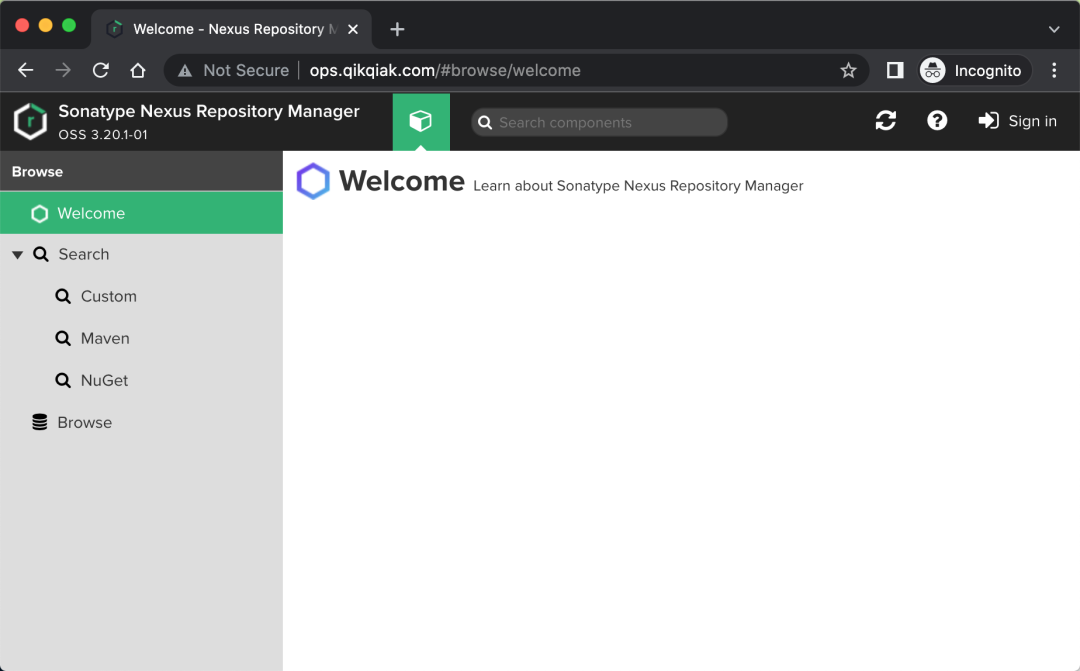
url rewrite
同样如果现在需要通过一个子路径来访问 Nexus 应用的话又应该怎么来实现呢?比如通过 http://ops.qikqiak.com/nexus 来访问我们的应用,首先我们肯定需要修改 ApisixRoute 对象中匹配的 paths 路径,将其修改为 /nexus:
apiVersion: apisix.apache.org/v2beta2
kind: ApisixRoute
metadata:
name: nexus
namespace: default
spec:
http:
- name: root
match:
hosts:
- ops.qikqiak.com
paths:
- "/nexus*"
backends:
- serviceName: nexus
servicePort: 8081
更新后我们可以通过 http://ops.qikqiak.com/nexus 访问应用:
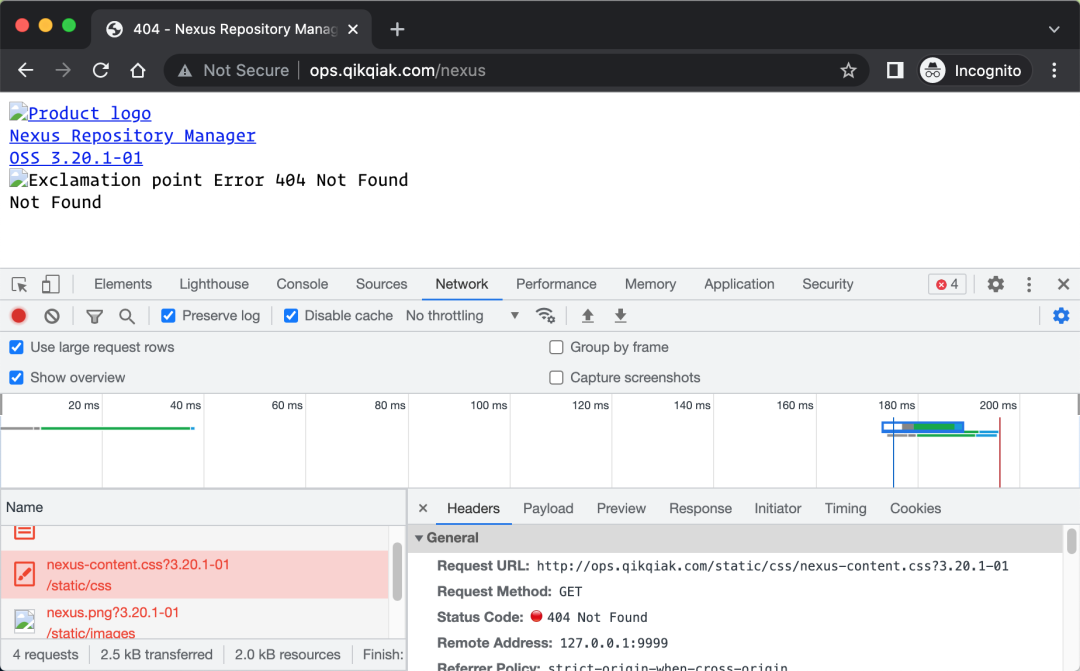
仔细分析发现很多静态资源404了,这是因为现在我们只匹配了 /nexus 的请求,而我们的静态资源是 /static 路径开头的,当然就匹配不到了,所以就出现了404,所以我们只需要加上这个 /static 路径的匹配就可以了,同样更新 ApisixRoute 对象,新增 /static/* 路径支持:
apiVersion: apisix.apache.org/v2beta2
kind: ApisixRoute
metadata:
name: nexus
namespace: default
spec:
http:
- name: root
match:
hosts:
- ops.qikqiak.com
paths:
- "/nexus*"
- "/static/*"
backends:
- serviceName: nexus
servicePort: 8081
更新后发现虽然静态资源可以正常访问了,但是当我们访问 http://ops.qikqiak.com/nexus 的时候依然会出现 404 错误。
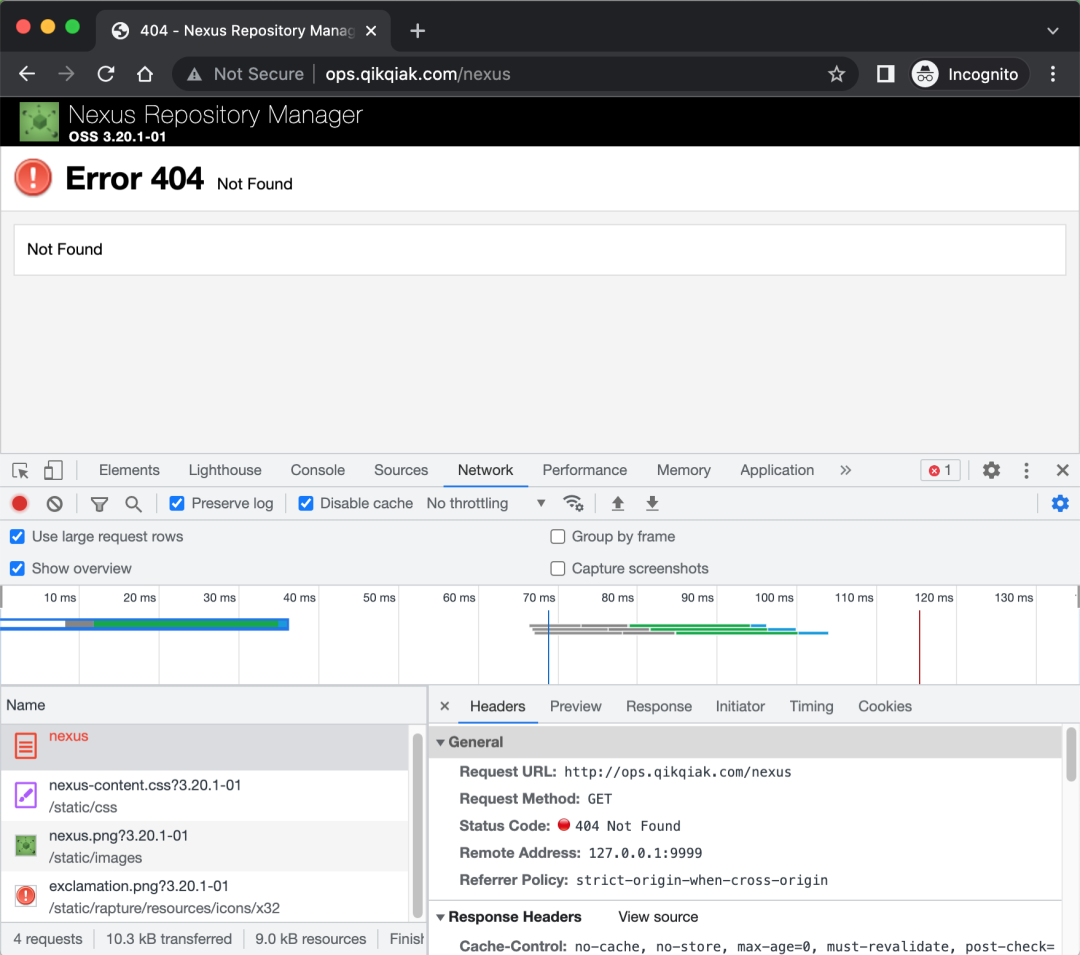
这是因为我们这里是将 /nexus 路径的请求直接路由到后端服务去了,而后端服务没有对该路径做任何处理,所以也就是404的响应了,在之前 ingress-nginx 或者 traefik 中我们是通过 url 重写来实现的,而在 APISIX 中同样可以实现这个处理,相当于在请求在真正到达上游服务之前将请求的 url 重写到根目录就可以了,这里我们需要用到 proxy-rewrite 这个插件(需要确保在安装的时候已经包含了该插件),proxy-rewrite 是上游代理信息重写插件,支持对 scheme、uri、host 等信息的重写,该插件可配置的属性如下表所示:
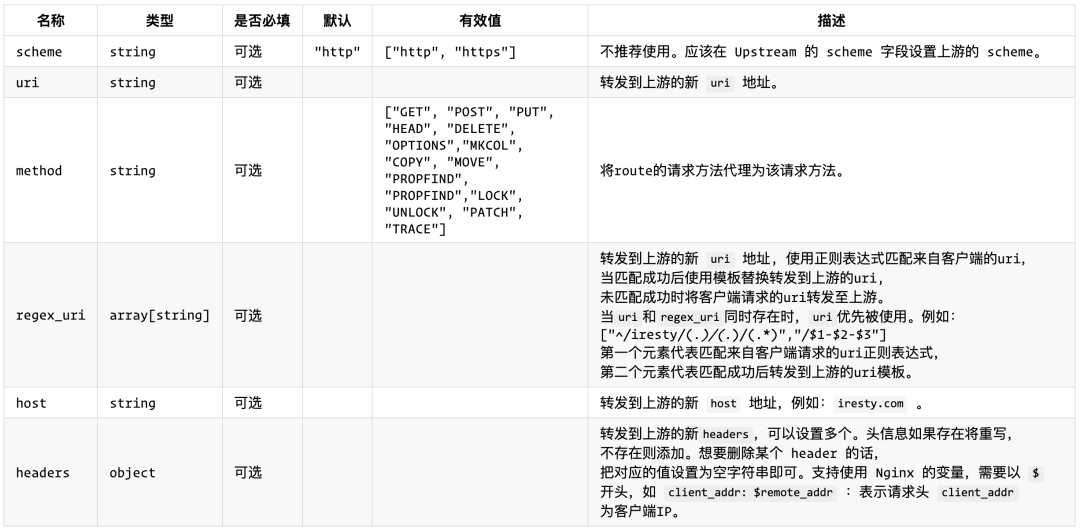
我们现在的需求是希望将所有 /nexus 下面的请求都重写到根路径 / 下面去,所以我们应该使用 regex_uri 属性,转发到上游的新 uri 地址, 使用正则表达式匹配来自客户端的 uri,当匹配成功后使用模板替换转发到上游的 uri, 未匹配成功时将客户端请求的uri 转发至上游,重新修改后的 ApisixRoute 对象如下所示,新增 plugins 属性来配置插件:
apiVersion: apisix.apache.org/v2beta2
kind: ApisixRoute
metadata:
name: nexus
namespace: default
spec:
http:
- name: root
match:
hosts:
- ops.qikqiak.com
paths:
- "/nexus*"
- "/static/*"
plugins:
- name: proxy-rewrite
enable: true
config:
regex_uri: ["^/nexus(/|$)(.*)", "/$2"]
backends:
- serviceName: nexus
servicePort: 8081
这里我们启用一个 proxy-rewrite 插件,并且将所有 /nexus 路径的请求都重写到了 / 跟路径下,重新更新后再次访问 http://ops.qikqiak.com/nexus 应该就可以正常访问了:
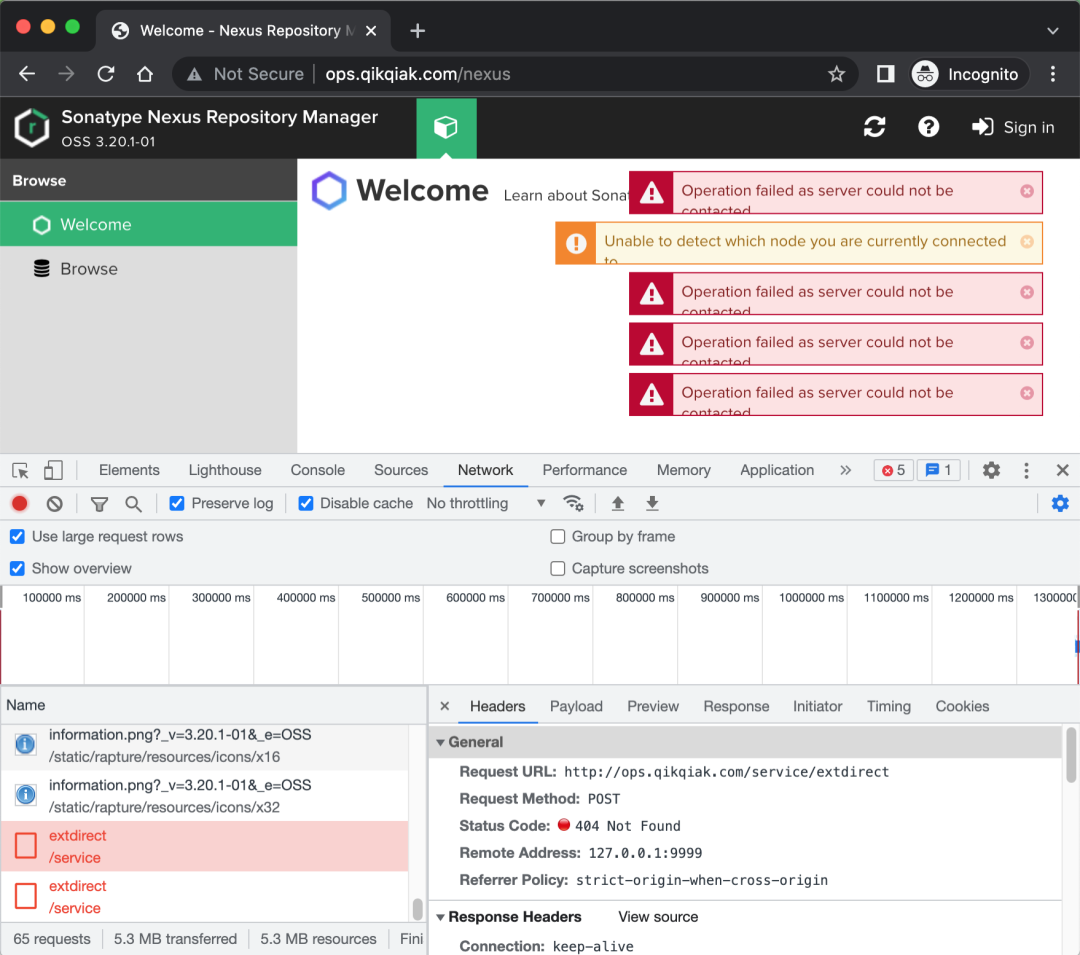
只有最后一个小问题了,从浏览器网络请求中可以看出我们没有去匹配 /service 这个路径的请求,只需要配置上该路径即可,如下所示:
apiVersion: apisix.apache.org/v2beta2
kind: ApisixRoute
metadata:
name: nexus
namespace: default
spec:
http:
- name: root
match:
hosts:
- ops.qikqiak.com
paths:
- "/nexus*"
- "/static/*"
- "/service/*"
plugins:
- name: proxy-rewrite
enable: true
config:
regex_uri: ["^/nexus(/|$)(.*)", "/$2"]
backends:
- serviceName: nexus
servicePort: 8081
现在重新访问子路径就完成正常了:
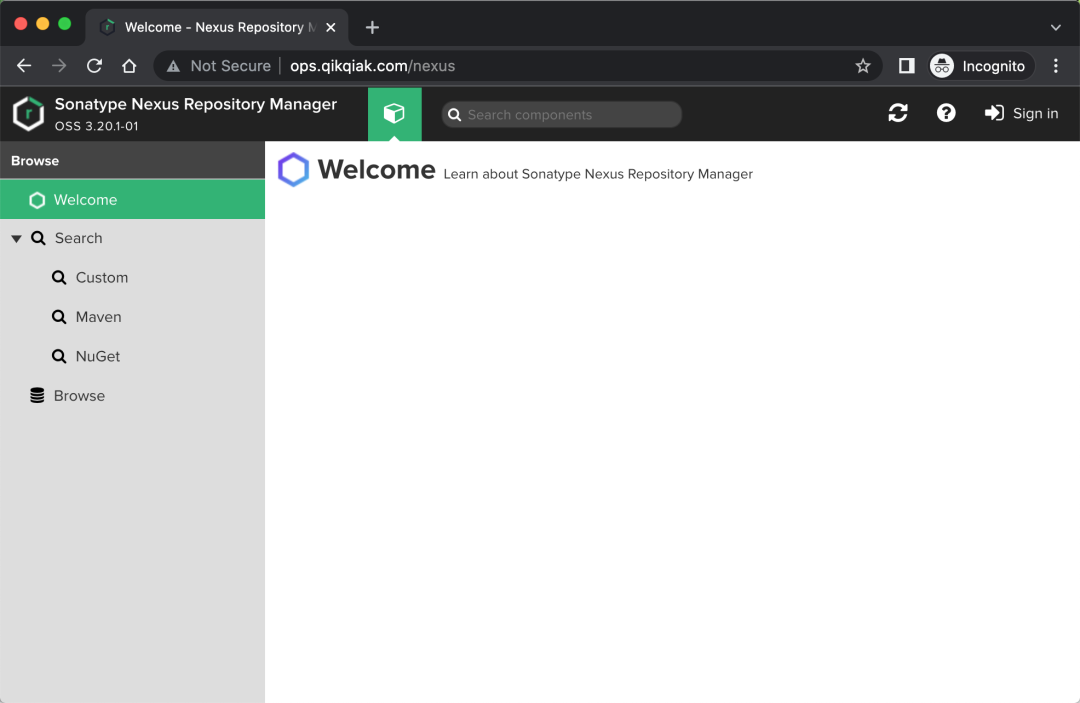
redirect
现在当我们访问 http://ops.qikqiak.com/nexus 或者 http://ops.qikqiak.com/nexus/ 的时候都可以得到正常的结果,一般来说我们可能希望能够统一访问路径,比如访问 /nexus 子路径的时候可以自动跳转到 /nexus/ 以 Splash 结尾的路径上去。同样要实现该需求我们只需要使用一个名为 redirect 的插件即可,该插件是 URI 重定向插件,可配置的属性如下所示:
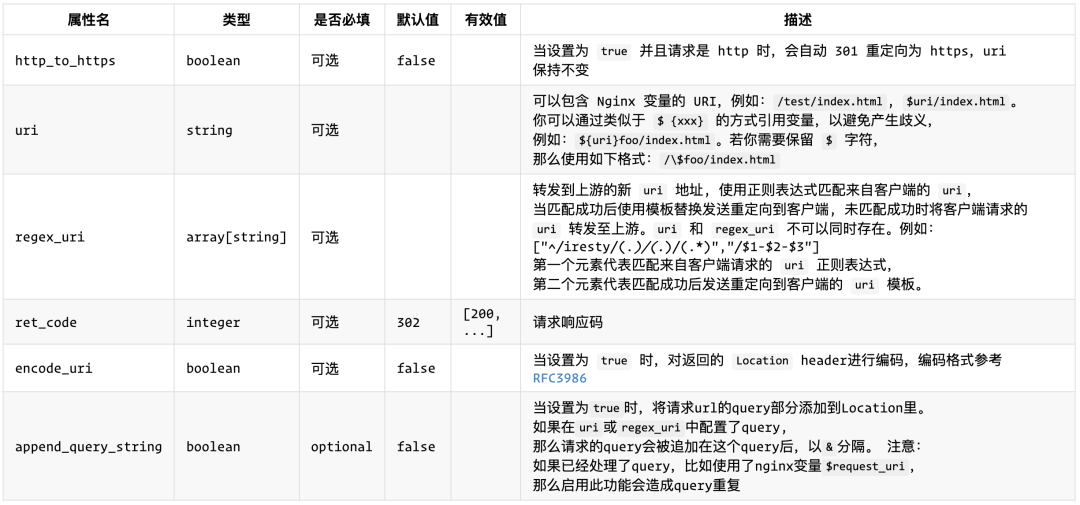
要实现我们的需求直接使用 regex_uri 这个属性即可,只需要去匹配 /nexus 的请求,然后进行跳转即可,更新 ApisixRoute 对象:
apiVersion: apisix.apache.org/v2beta2
kind: ApisixRoute
metadata:
name: nexus
namespace: default
spec:
http:
- name: root
match:
hosts:
- ops.qikqiak.com
paths:
- "/nexus*"
- "/static/*"
- "/service/*"
plugins:
- name: proxy-rewrite
enable: true
config:
regex_uri: ["^/nexus(/|$)(.*)", "/$2"]
- name: redirect
enable: true
config:
regex_uri: ["^(/nexus)$", "$1/"]
backends:
- serviceName: nexus
servicePort: 8081
我们新启用了一个 redirect 插件,并配置 regex_uri: ["^(/nexus)$", "$1/"],这样当访问 /nexus 的时候会自动跳转到 /nexus/ 路径下面去。
同样如果我们想要重定向到 https,只需要在该插件下面设置 config.http_to_https=true 即可:
# ... 其他部分省略
- name: redirect
enable: true
config:
http_to_https: true
tls
通过使用上面的 redirect 插件配置 http_to_https 可以将请求重定向到 https 上去,但是我们现在并没有对我们的 ops.qikqiak.com 配置 https 证书,这里我们就需要使用 ApisixTls 对象来进行证书管理。
我们先使用 openssl 创建一个自签名的证书,当然你有正规 CA 机构购买的证书的话直接将证书下载下来使用即可:
➜ openssl req -x509 -nodes -days 365 -newkey rsa:2048 -keyout tls.key -out tls.crt -subj "/CN=ops.qikqiak.com"
然后通过 Secret 对象来引用上面创建的证书文件:
# 要注意证书文件名称必须是 tls.crt 和 tls.key
➜ kubectl create secret tls ops-tls --cert=tls.crt --key=tls.key
然后就可以创建一个 ApisixTls 资源对象,引用上面的 Secret 即可:
apiVersion: apisix.apache.org/v1
kind: ApisixTls
metadata:
name: ops-tls
spec:
hosts:
- ops.qikqiak.com
secret:
name: ops-tls
namespace: default
同时 APISIX TLS 还可以配置 spec.client,用于进行 mTLS 双向认证的配置。上面的资源对象创建完成后,即可访问 https 服务了(chrome 浏览器默认会限制不安全的证书,只需要在页面上输入 thisisunsafe 即可访问了):
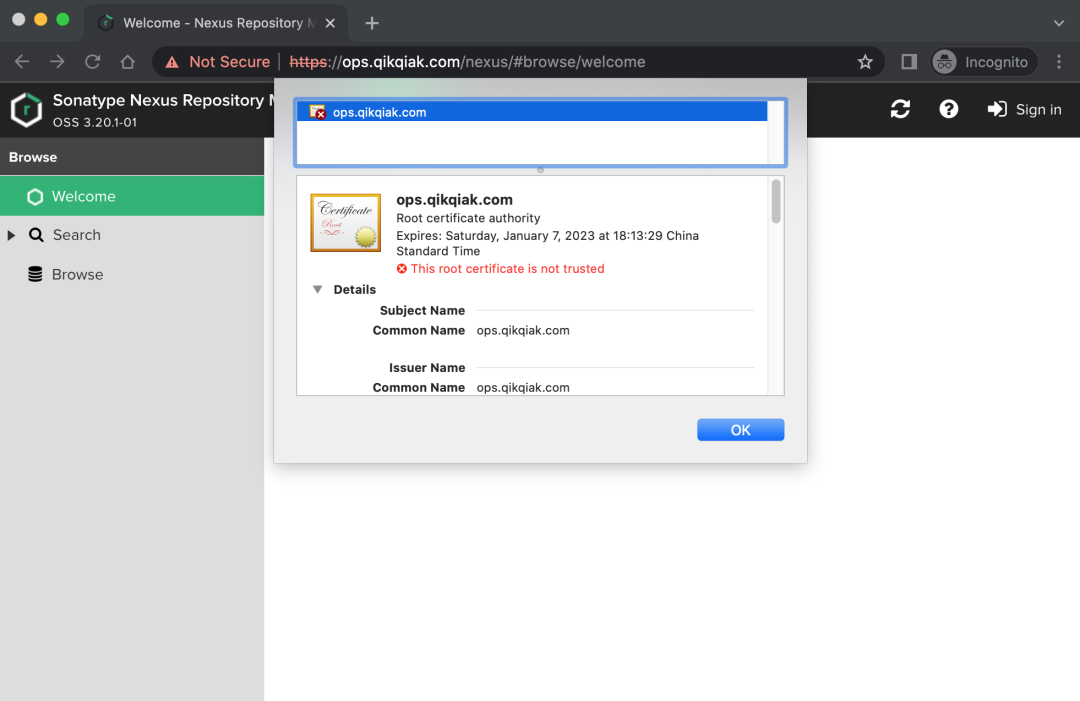
而且当访问 http 的时候也会自动跳转到 https 上面去,此外我们还可以结合 cert-manager 来实现自动化的 https。
完整的资源对象如下所示:
apiVersion: apisix.apache.org/v2beta2
kind: ApisixRoute
metadata:
name: nexus
namespace: default
spec:
http:
- name: root
match:
hosts:
- ops.qikqiak.com
paths:
- "/nexus*"
- "/static/*"
- "/service/*"
plugins:
- name: proxy-rewrite
enable: true
config:
regex_uri: ["^/nexus(/|$)(.*)", "/$2"]
- name: redirect
enable: true
config:
regex_uri: ["^(/nexus)$", "$1/"]
- name: redirect
enable: true
config:
http_to_https: true
backends:
- serviceName: nexus
servicePort: 8081
---
apiVersion: apisix.apache.org/v1
kind: ApisixTls
metadata:
name: ops-tls
spec:
hosts:
- ops.qikqiak.com
secret:
name: ops-tls
namespace: default
关于 APISIX Ingress 更多高级用法请继续关注后续文章。
